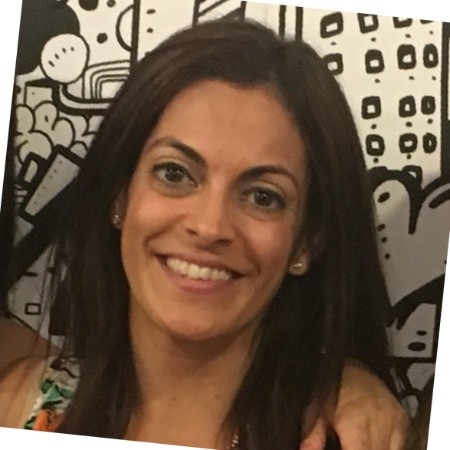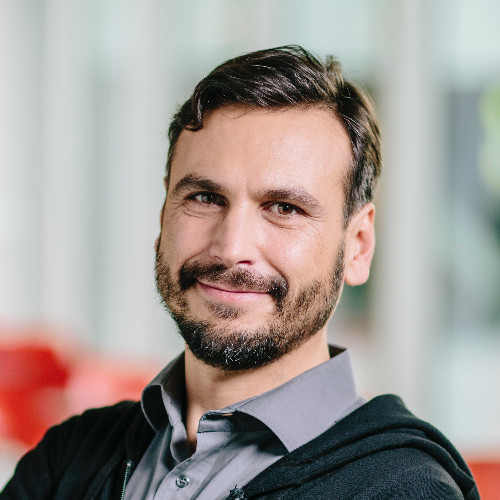Keynote Speakers
We are happy to announce that our keynote speakers will be Nuria Pelechano and Max Di Luca!
Virtual Crowds – Simulation, validation, and everything in betweenFor the last fifteen years my research focus has been to improve the overall realism of large groups of virtual humanoids. I have worked on different aspects of this challenge including rendering, animation and simulation for real-time applications. Real-time implies trade-offs between realism and performance, and here is where perception plays a major role. Understanding human perception is crucial when performing qualitative evaluation of animation and simulation models for which there are no obvious quantitative validation methods. In my speech I will present results on how we have used perception to evaluate different aspects of crowd simulation. I will start with the visual realism of rendering, which allowed us to find the optimal limits between fully animated rigged characters and our more efficient rendering with animated per-joint impostors. I will then cover the complexity of using perception to validate crowd simulation models, with a focus on lessons learned on how the animation itself can strongly affect the evaluation of simulation models. Finally, I will present our most recent work on Immersive Virtual Reality, where we are studying how crowd appearance and movement can have an impact on user behaviour and decision making.
Multisensory perception of hands and objects
In our everyday life, we grasp and manipulate objects without being aware that such interactions produce multiple sensory signals. My talk focuses on the interactive and coupled nature of these multiple sources of sensory information about our hands and the objects. I will describe VR experiments where participants saw modified visualizations of their hands and interacted with objects having visual-haptic incongruencies. The results of these studies show that perception is lawfully related to the multiple sources of sensory information that are captured by the body. The impression of touching an object requires to infer the cause of the multiple sensory signals, which is not only linked to object properties, but also to the hand that comes in contact with the object. Such knowledge can be applied to understand and improve the believability of hand-based interactions with virtual objects.
Schedule [ PDF ]
| Event | Time |
|---|---|
| Preregistration | 5:00 p.m. - 7:00 p.m. |
| Informal social event | from 7:30 p.m. |
| Event | Time |
|---|---|
| Registration | 9:00 a.m. - 10:00 a.m. |
| Welcome and Opening remarks | 10:00 a.m. - 10:15 a.m. |
| Keynote speaker | 10:15 a.m. - 11:15 a.m. |
| Poster Fast-forward | 11:15 a.m. - 11:30 a.m. |
| Coffee and Posters | 11:30 a.m. - 12:00 p.m. |
| Papers - Session 1 Virtual Space | 12:00 p.m. - 1:15 p.m. |
| Lunch break | 1:15 p.m. - 3:00 p.m. |
| Papers - Session 2 Human Motions | 3:00 p.m. - 4:30 p.m. |
| Coffee and Posters | 4:30 p.m. - 5:00 p.m. |
| Papers - Session 3 Avatars and Rendering Humans | 5:00 p.m. - 7:00 p.m. |
| Reception | from 7:00 p.m. |
| Event | Time |
|---|---|
| Registration | 9:00 a.m. - 10:15 a.m. |
| Papers - Session 4 Viewpoint in VR | 10:15 a.m. - 11:45 a.m. |
| Coffee and Posters | 11:45 a.m. - 12:15 p.m. |
| Papers - Session 5 Haptics and Images | 12:15 p.m. - 1:15 p.m. |
| Lunch break | 1:15 p.m. - 3:00 p.m. |
| BUSINESS MEETING | 3:00 p.m. - 3:30 p.m. |
| Papers - Session 6 Gaze and Attention | 3:30 p.m. - 5:30 p.m. |
| Coffee and Posters | 5:30 p.m. - 6:00 p.m. |
| Cap Note Speaker | 6:00 p.m. - 7:00 p.m. |
| Day | Time |
|---|---|
| Wednesday, 18th | 6:30 p.m. - 7:30 p.m. |
| Thursday, 19th | 6:30 p.m. - 7:30 p.m. |
| Friday, 20th | 1:00 p.m. - 2:00 p.m. |
Accepted papers
Session 1: Virtual Space
Session Chair: Victoria Interrante
- Infinity Walk in VR: Effects of Cognitive Load on Velocity during Continuous Long Distance Walking. Omar Janeh, Nikolaos Katzakis, Jonathan Tong, & Frank Steinicke (20')
- Stimulating the Brain in VR: Effects of Transcranial Direct-Current Stimulation on Redirected Walking. Eike Langbehn, Frank Steinicke, Ping Koo-Poeggel, Lisa Marshall, & Gerd Bruder (20')
- Perception of Spatial Relationships in Impossible Spaces. Andrew Robb & Catherine Barwulor (15')
- How Video Game Locomotion Methods Affect Navigation in Virtual Environments. Richard Paris, Joshua Klag, Priya Rajan, Lauren Buck, Timothy McNamara, & Bobby Bodenheimer (20')
Session 2: Human Motions
Session Chair: Katja Zibrek
- EVA: Modeling Perceived Emotions of Virtual Agents using Expressive Features of Gait and Gaze. Tanmay Randhavane, Aniket Bera, Kyra Kapsaskis, Rahul Sheth, Kurt Gray, & Dinesh Manocha (20')
- Perceptual Comparison of Synthetic and Data-Driven Detailed Eye Motion. Sophie Joerg, Andrew Duchowski, Krzysztof Krejtz, & Anna Niedzielska (15')
- Predicting perceived naturalness of human animations based on generative movement primitive models. Benjamin Knopp, Dmytro Velychko, Johannes Dreibrodt, & Dominik Endres (20')
- Do We Have to Look at the Mirror All the Time? Effect of Partial Visuomotor Feedback on Body Ownership of a Virtual Human Tail. Ryota Ito, Nami Ogawa, Takuji Narumi, & Michitaka Hirose (20')
Session 3: Avatars and Rendering Humans
Session Chair: Bobby Bodenheimer
- Emotion and Attention Interplay Examination During Interaction With Virtual Humans. Matias Volonte, Reza Ghaiumy Anaraky, Bart Knijnenburg, Andrew T. Duchowski, & Sabarish V. Babu (20')
- A phychophysical model to control the brightness and key-to-fill ratio in CG cartoon character lighting. Pisut Wisessing, Katja Zibrek, Douglas Cunningham, & Rachel McDonnell (15')
- Is photorealism important for perception of expressive virtual humans in VR? Katja Zibrek, Rachel McDonnell, & Sean Martin (20')
- The Influence of the Viewpoint in a Self-Avatar on Body Part and Self-Localization. Albert van der Veer, Adrian Alsmith, Matthew Longo, Hong Yu Wong, Daniel Diers, Anna Giron, Matthias Bues, & Betty Mohler (20')
- Virtual Grasping Feedback and Virtual Hand Ownership. Ryan Canales, Aline Normoyle, Yu Sun, Yuting Ye, Massimiliano Di Luca, & Sophie Jörg (20')
- The Influence of Visual Perspective on Body Size Estimation in Immersive Virtual Reality. Anne Thaler, Sergi Pujades, Jeanine Stefanucci, Sarah Creem-Regehr, Joachim Tesch, Michael Black, & Betty J. Mohler (20')
Session 4: Viewpoint in VR
Session Chair: Frank Steinicke
- An Analysis of User Perception Regarding Body-Worn 360 Camera Placements and Heights. Kevin Pfeil, Pamela Wisniewski, & Joseph J. Laviola (20')
- Keep it simple: Depth-based Dynamic Adjustment of Rendering for Head-mounted Displays Decreases Visual Comfort. Jochen Jacobs, Xi Wang, & Marc Alexa (20')
- Am I Floating or Not?: Fidelity of Eye Height Perception in HMD-based Immersive Virtual Environments. Zhihang Deng & Victoria Interrante (15')
- Differences in Visual and Haptic Perception of Expressive 1DoF Motion. Elyse Chase & Sean Follmer (20')
Session 5: Haptics and Images
Session Chair: Robert Allison
- The Effect of Motion on the Perception of Material Appearances. Ruiquan Mao, Manuel Lagunas, Belen Masia, & Diego Gutierrez (20')
- Comparison of subjective methods, with and without reference, for quality assessment of 3D graphics. Yana Nehmé, Jean-Philippe Farrugia, Florent Dupont, Patrick LeCallet, & Guillaume Lavoué (20')
- Spectral Visualization Sharpening. Liang Zhou, Rudolf Netzel, Daniel Weiskopf, & Chris Johnson (20')
Session 6: Gaze and Attention
Session Chair: Eakta Jain
- Transsaccadic Awareness of Scene Transformations in a 3D Virtual Environment. Maryam Keyvanara & Robert Allison (20')
- Measurements of contrast sensitivity for peripheral vision. Michał Chwesiuk & Radosław Mantiuk (20')
- Reading Speed Decreases for Fast Readers Under Gaze-Contingent Rendering. Rachel Albert, Angelica Godinez, & David Luebke (15')
- Towards VR Attention Guidance: Environment-dependent Perceptual Threshold for Stereo Inverse Brightness Modulation. Steve Grogorick, Jan-Philipp Tauscher, Georgia Albuquerque, Marc Kassubeck, & Marcus Magnor (15')
- Assessment of Driver Attention during a Safety Critical Situation in VR to Generate VR-based Training. Efe Bozkir, David Geisler & Enkelejda Kasneci (15')
- The effect of task on visual attention in interactive virtual environments. Jacob Hadnett-Hunter, Eamonn O'Neill, Michael Proulx, & George Nicolaou (20')
Accepted posters
- A Glyph-based Multimodal Presentation of Multivariate Data. Shamima Yasmin
- Adult to Child Age Regression Using CycleGANs. Thomas Domas, Yuzhu Dong, Brendan John, Ariel Shamir, Andreas Aristidou, & Eakta Jain
- Age Regression for Human Voices. Martin T. Schorradt & Douglas Cunningham
- Child2adult: Revisiting dynamic scaling laws to age motion. Yuzhu Dong, Lisa Anthony, & Eakta Jain
- Effect of Observing a Virtual Double on Paranoia in Social Virtual Environments: Experiment Preliminary Presentation. Geoffrey Gorisse & Mel Slater
- Evaluation of Low-Cost Embodiment with Virtual Avatars. Dmitry Vyakhirev, Kelley Parsons, Jack Tsao, Betsy Williams, & Daniel Blustein
- FVA: Modeling Perceived Friendliness of Virtual Agents Using Movement Characteristics. Tanmay Randhavane, Aniket Bera, Kyra Kapsaskis, Kurt Gray, & Dinesh Manocha
- Identifying Emotions from Walking Using Affective & Deep Features. Tanmay R&havane, Uttaran Bhattacharya, Aniket Bera, Kyra Kapsaskis, Kurt Gray, & Dinesh Manocha
- Perception of blendshape importance for virtual faces. Emma Carrigan, Katja Zibrek, Rachel McDonnell
- Proteus Effect of a Muscular Avatar on Weight Perception in Virtual Reality. Kentaro Sumida, Nami Ogawa, Takuji Narumi, & Hirose Michitaka
- Realistic Virtual H& Fosters Self-attribution of Remapped H& Movements. Nami Ogawa, Takuji Narumi, & Michitaka Hirose
- Sounds for directing visual attention in real-word scenes. Daria Kvasova & Salvador Soto-Faraco
- The Detectability of Computational Delay in Haptic Rendering. Diar Abdlkarim, Min Li, Massimiliano Di Luca, Roberta Roberts, & Alan Wing
- The Effect of Tactile Delay on Subjective Perception of Virtual Surface. Min Li, Massimiliano Di Luca, Diar Adblkarim, Roberta Roberts, & Alan Wing
- The Influence of Step Length to Step Frequency Ratio on the Perception of Virtual Walking Motions. Benjamin Niay, Anne-Hélène Olivier, Julien Pettré, & Ludovic Hoyet
- Wide Computationalism & Perceptual Problem Solving. Pankaj Singh
A note for paper presenters: If you are presenting a long paper, you have 20 minutes for your presentation including questions. If you are presenting a short paper, you have 15 minutes for your presentation including questions. Poster fast-forward presentations should last 1 min.





